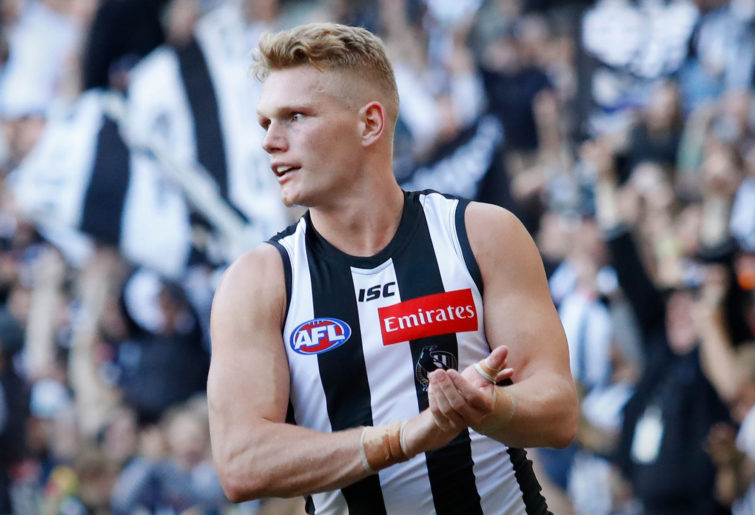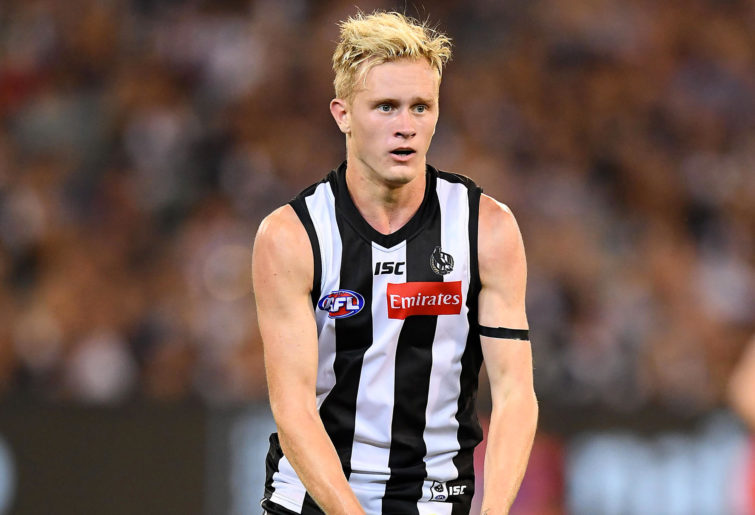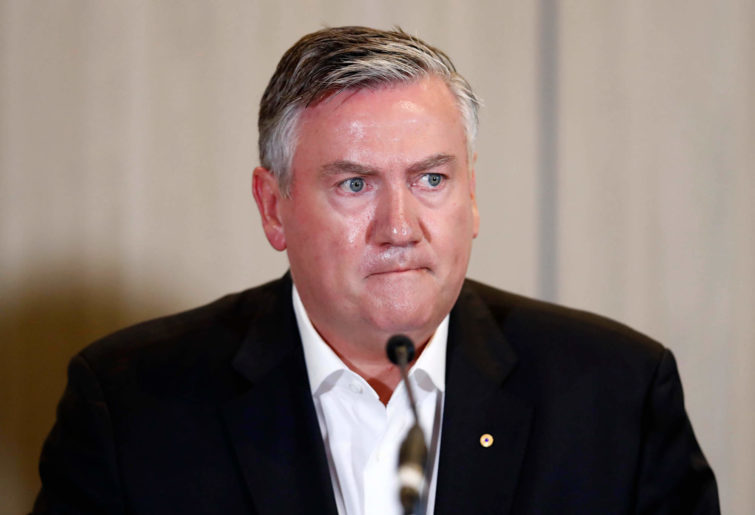Eddie McGuire has proven that he doesn’t have to be Collingwood president to come out swinging when defending the club.
On Footy Classified last week Sam McClure referenced that Collingwood’s list management had been a “debacle since about five years ago”.
McGuire immediately leapt to Collingwood’s defence, citing that Collingwood had come within a kick of winning the flag in 2018 and a kick within making another grand final in 2019 and had beat West Coast in a final last year in “one of the great wins of all time”.
McGuire also claimed there are 11 clubs in a worse situation than Collingwood and that the Magpies could’ve “kicked [their salary cap issues] down the road even further”.
Let’s examine some things here: I know nothing about finance or salary caps, but surely judicious management could’ve continued to massage the cap indefinitely while they got it back under control. Surely it would only remain an issue if they kept using the same back-ending strategies.
Given the age profile of Scott Pendlebury, Steele Sidebottom and Jeremy Howe and given that Chris Mayne and Levi Greenwood are almost certain to retire at the end of 2021, wasn’t there relief in sight? Maybe it wasn’t enough, but surely it would’ve given them room to manoeuvre.
That Collingwood couldn’t do this suggests either that the salary cap is a bigger mess than they’re admitting or that they have tried to clear room for a free agent. If it’s the latter, we can only judge them come the next trade period – if a free agent would still want to come to Collingwood in their current condition.
While McGuire took umbrage at the figure of “five years ago”, he has to acknowledge that the cap issue didn’t happen overnight. The club did not wake up one morning to find they were suddenly $2 million over the cap. This would’ve been a slow build with plenty of warnings.

Adam Treloar in his former stripes (Photo by Adam Trafford/AFL Media/Getty Images)
Mark Korda, one of the current presidents, is a forensic accountant. The other president, Peter Murphy, reviewed the club’s operations at the end of 2017. McGuire would’ve been president for 18 years at that point. Ned Guy was appointed in 2017. You had an experienced football manager in Geoff Walsh coming (back) in.
Now, either these people recognised the dangers and ignored them or they didn’t recognise the dangers, which sends an entirely different message. Given the debacle is being sold as a strategy, did that strategy anticipate a fire sale? If so, it is reckless and irresponsible and damages the club as a brand.
If these powerbrokers foresaw these issues on the horizon, why did the club recruit Daniel Wells and Chris Mayne on big contracts, trade for Dayne Beams and re-sign the likes of Jaidyn Stephenson and Tom Phillips to prematurely hefty contracts? Instead of seeking relief the club took actions that created further pressure.
McClure continued to push the point of the list management being a “debacle”. McGuire then re-pushed Collingwood’s accomplishments of nearly winning a flag and nearly winning a preliminary final, again selling the 2020 elimination victory over West Coast.
“I get sick of people just making things up and just saying stupid things,” McGuire said.
To McClure’s credit, he withstood McGuire’s aggression and challenges.
“What am I making up?” he asked, like the scrawny kid in a schoolyard finally finding the courage to square up against a bully.
And then McGuire countered by asking how it was a debacle given Collingwood’s finals accomplishments. McClure conceded those accomplishments and declared that the list management didn’t work and that the club is now trying to “build” their way through it.
“Is winning the premiership the only matrix of a season being successful?” McGuire said.
Now, I understand McGuire’s logic – well, the logic Collingwood has sold behind the debacle – that the club did all this to give themselves the best chance of winning a flag.
Do I buy it though? Well, no. Not really. Other clubs have contended over extended periods without them culminating in fire sales. Perhaps they will also suffer pain in the future as Collingwood has. Perhaps. Richmond’s won three of the last four flags. Hawthorn three-peated. How did these clubs do it?
Some might counter that Richmond have lost players. Alex Rance’s retirement gave them salary cap wiggle room. Okay. But they also brought in Tom Lynch, who would be on relatively big dollars. They’ve lost a handful of other players, but their core has remained intact and they’re still up there.
Hawthorn lost Lance Franklin following the 2013 flag and then won flags in 2014 and 2015. Wasn’t that a cautionary tale for Collingwood? Didn’t this show them that there was a means to work through this outside of a fire sale? Maybe Collingwood should’ve identified some relief earlier.
Surely they didn’t need to retain somebody like Ben Reid for as long as they did given the issues he had with his body – well, unless he had a back-ended contract that demanded his retention. If that’s the case, how far back does this salary-cap wrangling reach?

Jaidyn Stephenson in his former colours (Photo by Quinn Rooney/Getty Images)
But the biggest folly of McGuire’s defence is claiming there are other metrics of success in a football season.
“Do you reckon last year wasn’t a successful season for Collingwood, going to Perth with all the things that went against the club with injuries and the draw and everything else?” McGuire ranted over McClure.
So what?
Seriously, is this considered a win at Collingwood? Winning one final and finishing sixth? Were they seriously celebrating this as some accomplishment behind closed doors once the season was done?
Well done, fellas! You’ve finished second, fourth and sixth! The ground’s the limit!
Honestly, I could understand this logic if Collingwood were a young team that had missed the finals for several years, finally made the eight and won that one final. It’s a great accomplishment, a fantastic taster and an indicator that the club is on an upward trend.
But not in Collingwood’s case – not given where Collingwood had come from. If anything, what it emphasised was that Collingwood could play great football when they took the game on but that they instead opt for their glacial, calculated and indirect ball movement, and this has contributed to their gradual on-field deterioration.
While some might cite other metrics, such as pumping games into kids – which Collingwood didn’t do in 2020 – or Darcy Moore and Taylor Adams’s All Australian seasons, these are things that can happen whether you finish first or 18th. A single final win has nothing to do with it.
Going back to Footy Classified, Matthew Lloyd calmly interjected that the trade period was a mess. McGuire then hit full spin mode.
“There were a lot of players that wanted to stay at Collingwood; a lot of players at other clubs were running out down the road.”
So Collingwood is to be commended for pushing out players who wanted to stay while other clubs should be criticised for losing players who wanted to leave?
Um, what?
I appreciate what McGuire might be trying to say here is that Collingwood has created a culture whereby players are happy at the club and want to play out their careers there. Great. Yet what the debacle has established is the multiple precedents that through no fault of their own players might be pushed out because the salary cap is a puzzle too hard for the powerbrokers to solve.
Just how much damage has Collingwood as a brand suffered? If I were Matt Rowell looking to change clubs, would I choose Collingwood knowing they might just shove me out later? Wouldn’t I rather go to a club where I’m sure I’ll finish my career?
Lloyd continued to calmly push the point, citing Ned Guy’s press conference as a “trainwreck”. McGuire responded: “Okay, he had one bad press conference – so did I and I’m not there anymore”.
Is this some sort of Freudian slip? Is McGuire suggesting that Guy shouldn’t be there anymore either? Or that he (McGuire) should still be there regardless of all these things going on?
McGuire elaborated that Ned Guy and Geoff Walsh were told to sort out the salary cap.
“It wasn’t pretty. In the end, you know what? There’s been plenty of other times when players have walked out of a club”.
This is an unequal parallel from people who’ve tried to rationalise the debacle. There are two different ways a player can leave a club: they can be pushed out or they can ask to leave. Predominantly it’s the latter.

Eddie McGuire. (Photo by Darrian Traynor/Getty Images)
Players look elsewhere for more opportunity, more money or better terms or simply because they need a change. It in no way compares to players who want to stay and are pushed out because the club is trying to relieve pressure in a salary cap they overly inflated.
“I’ll tell you what it was,” McGuire said. “It’s Trade Radio whipping things into a frenzy, and by Day 10, when you’ve asked how many times Jeremy Cameron is going down, this was a good, sexy story”.
McClure insisted that “you can’t blame the media”.
“I’m telling you what I think,” McGuire responded.
McClure again told him he couldn’t blame the media, and McGuire explained, “I’m not blaming the media; I’m telling you what happened”.
McClure’s right. I dislike media aggrandisement more than anybody, but this wasn’t a beat-up. This was a big story – three players driven from the club against their will to create salary-cap relief. And if that’s not bad enough, Collingwood received unders when trading them out. No, you cannot blame Trade Radio or the media or me for this.
This is entirely the club, and it deserved far more scathing and probing coverage than it received. It’s almost as if the media recoiled from McGuire’s anger, fearful of antagonising him. He remains a powerful figure.
As if realising he had been far too confrontational, McGuire regained his composure towards the end of the exchange to calmly add, “I said it was whipped up into a frenzy. These things happen in football all the time”.
Really? McClure said it’d happened at GWS, but have they ever pushed out three players? Outside of Devon Smith, who was told to start looking elsewhere while he was still contracted, it seems most players have left GWS to seek greener pastures.
The last time I recall something of this magnitude happening was when Essendon – preliminary finalists in 1999, premiers in 2000, grand finalists in 2001 and finalists in 2002 – had to shed Blake Caracella, Justin Blumfield and Chris Heffernan due to salary cap issues.
Essendon had banked on James Hird becoming a veteran in 2003 due to a change they believed was going to happen in the qualifications, so they re-signed players. But the AFL stuck with existing veteran qualifications, which meant the club was now $600,000 over the cap. The issue was handed over to the football department, who told these three players to find new clubs and that they would be traded.
“It ripped the heart out of our footy club,” Matthew Lloyd said about the time on the Essendon Football Club’s website. “The boys were in tears and said we don’t want to play for another club.”
Robert Shaw, an assistant coach at the club at the time and the website’s author on this chapter, agreed with Lloyd’s sentiment, which shows the repercussions issues such as this can cause.
We don’t know how this has affected Collingwood as yet in terms of camaraderie and team morale, although the team have looked listless in several of their performances. Sadly, we’ve seen listless performances like this before simply because they can’t get their systems functioning.
However, we are already seeing that their depth is being tested.
As far as McGuire goes, as much as I loved his zeal in the first half of his tenure as Collingwood president and as much as I admire, respect and appreciate his passion, his performance on Footy Classified is emblematic of the biggest problems at contemporary Collingwood: bluster, lack of accountability and ego.
And I can’t cite McGuire as the cause. This has been going on for almost the entire time I’ve actively followed Collingwood – since 1980. Read Richard Stremski’s excellent Kill For Collingwood and you’ll see it had also been going on before.
The club has a great history, but that success has inflated the hyperbole until those involved with the club (officially and unofficially) have lost all sense of proportion. “We are the greatest.” “We are the biggest.” “We are the best.” Blah blah blah. These are all typical proclamations that have come from Collingwood over the decades. Given their lack of accomplishment in the modern era, you would think they would show a little modesty.
They’ve lost all their claims to fame – leaders on the premiership table, most members et cetera. And if they don’t stop and take honest stock, they could very well see themselves slipping into obscurity while continuing to try living vicariously through their halcyon days of the 1920s and 1930s for relevance.
I say often that the best administration I’ve seen at Collingwood was 1987-90. The club had faced bankruptcy in 1986. The banks had recommended they close their doors. The administration changed from the high-profile New Magpies to an anonymous low-key administration. Only players who wanted to be there remained.
And the club forged onwards.
The best thing about it is they shut up, they shelved the braggadocio – after all, what could you boast about given how mismanagement had humbled the club and almost pushed it into extinction? – and they worked assiduously at rebuilding Collingwood from the ground up.
That administration led to the 1990 flag.
With that success behind them, all the things wrong with Collingwood came back. An outspoken president. Off-field disciplinary issues. A cavalier attitude. A lack of forward planning. Appointing a favourite son as coach with very little experience behind him. An on-field decline. Stop me if you recognise the pattern.
Just nine years after that historic 1990 flag Collingwood won a wooden spoon and again faced financial insolvency. What’s that saying about those who don’t learn from history?
As we face a new era in black and white I certainly know what I want going forward.
Unfortunately I fear what we’re going to get.































































































